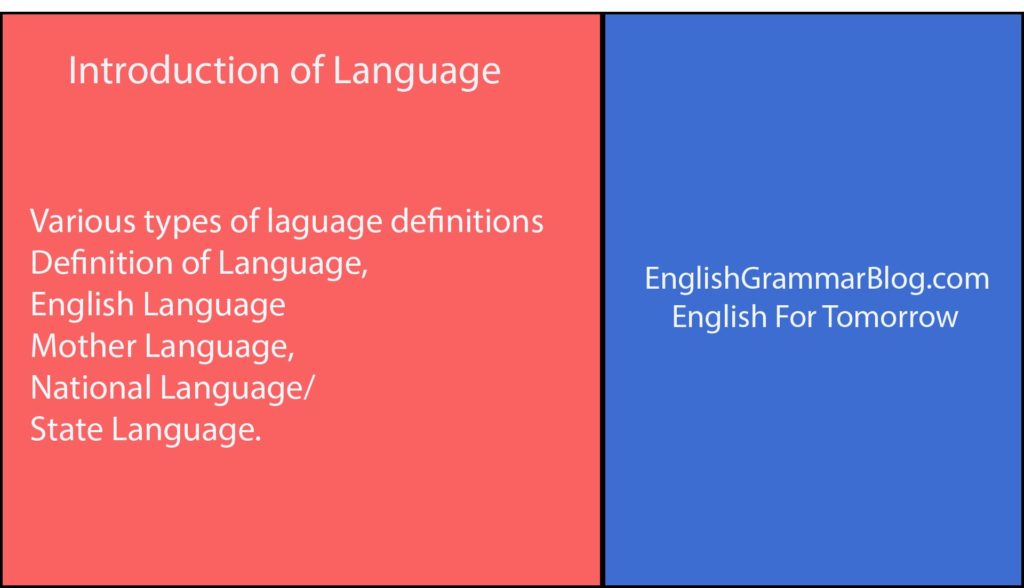Introduction of Language
Man exchanges thoughts and emotion with each other on the basis of need. It means that we, human beings, talk among us just for communicating.
What is told for exchanging thoughts and emotions of our own is the collection or summation of some sound. Based on the total sounds that are produced for communicating is called language.
Why is animal’s sound not language?
But except human being, no animal can talk but they produce some meaningless full sound.
They are as follows:
| SL | Animals | Sounds |
| 1 | Cow produces | “Humba Humba” |
| 2 | Crow produces | “Kaka” |
| 3 | Cook produces | “KurKur” |
| 4 | Cuckoo produces | “Kuhu Kuhu” |
These don’t make any meaning to human beings. That’s why others animal sounds that are produced for communication among themselves is not language.
Definition of Language:
The sound which is used to express a sense for communication is called a language.
In another way, we can say the language definition:
Language is an art of expressing the meaningful thought of mind.
Definition of language by different scholars:
Here in the below is given the definition of language by different scholars;
Definition of language by Noam Chomsky:
“Language is a set (finite or infinite) of sentences, each finite in length, and constructed out of a finite set of elements’. Noam Chomsky, Syntactic Structures (1957: 13)
Definition of language by Oxford Advanced Learner’s Dictionary:
“Language is the system of communication in speech and writing that is used by people of a particular country: The Japanese language”
Notes of Language:
- There are many people in the world. There are many languages available in the world.
- The people of Bangladesh speak a language which is called Bengali Language.
- Such as the China People speak in Chinese language and The people of Japan speak in Japanese language
Mother Language/Mother Tongue:
Define mother tongue is in the below
Human beings learns a language from her or his mother. The language which is learnt from his or her mother by the human beings is called mother language. Every nation of the world speak on his or her own mother tongue.
Example of mother tongue
- The mother tongue of Bangladesh is Bengali
- The mother tongue of India is Hindi
- The mother tongue of Pakistan is Urdu
Introduction National Language/State Language:
National language means state language. Each country has a state language.
Definition of National Language/State Language:
The language which is permitted and approved by the government of that country is called National Language/State Language.
Here in the below there are some National Languages/State Languages as follows:
| SL | Country | National Language/ State language |
| 1 | Bangladesh | Bengali |
| 2 | India | Hindi |
| 3 | USA/UK | English |
| 4 | Saudi Arabia | Arabic |
| 5 | China | Chinese |
| 6 | Pakistan | Urdu |
Introduction of English Language:
The people of Great Britain is called English man. So the language which is used by them is called English Language.
Definition of English Language
The people who speak in English for expressing his or her sense of mind for talking and for writing is called English Language.
Exercises on languages:
- What is a language?
- What is the name of your language?
- Name five languages of the word?
- How many languages are in use in the world?
- What is mother tongue?
- What is international Language?
Top 20 of the most widely spoken languages by “First language” speakers (2009)
| Rank | Language | Primary Country | Number of total countries where the language is spoken | Speakers (millions) |
| 1 | Chinese | China | 31 | 1,213 |
| 2 | Spanish | Spain | 44 | 329 |
| 3 | English | United Kingdom | 112 | 328 |
| 4 | Arabic | Saudi Arabia | 57 | 221 |
| 5 | Hindi | India | 20 | 182 |
| 6 | Bengali | Bangladesh | 10 | 181 |
| 7 | Portuguese | Portugal | 37 | 178 |
| 8 | Russian | Russian Federation | 33 | 144 |
| 9 | Japanese | Japan | 25 | 122 |
| 10 | German, Standard | Germany | 43 | 90.3 |
| 11 | Javanese | Indonesia | 5 | 84.6 |
| 12 | Lahnda | Pakistan | 8 | 78.3 |
| 13 | Telugu | India | 10 | 69.8 |
| 14 | Vietnamese | Viet Nam | 23 | 68.6 |
| 15 | Marathi | India | 5 | 68.1 |
| 16 | French | France | 60 | 67.8 |
| 17 | Korean | Korea | 33 | 66.3 |
| 18 | Tamil | India | 17 | 65.7 |
| 19 | Italian | Italy | 34 | 61.7 |
| 20 | Urdu | Pakistan | 23 | 60.6 |

